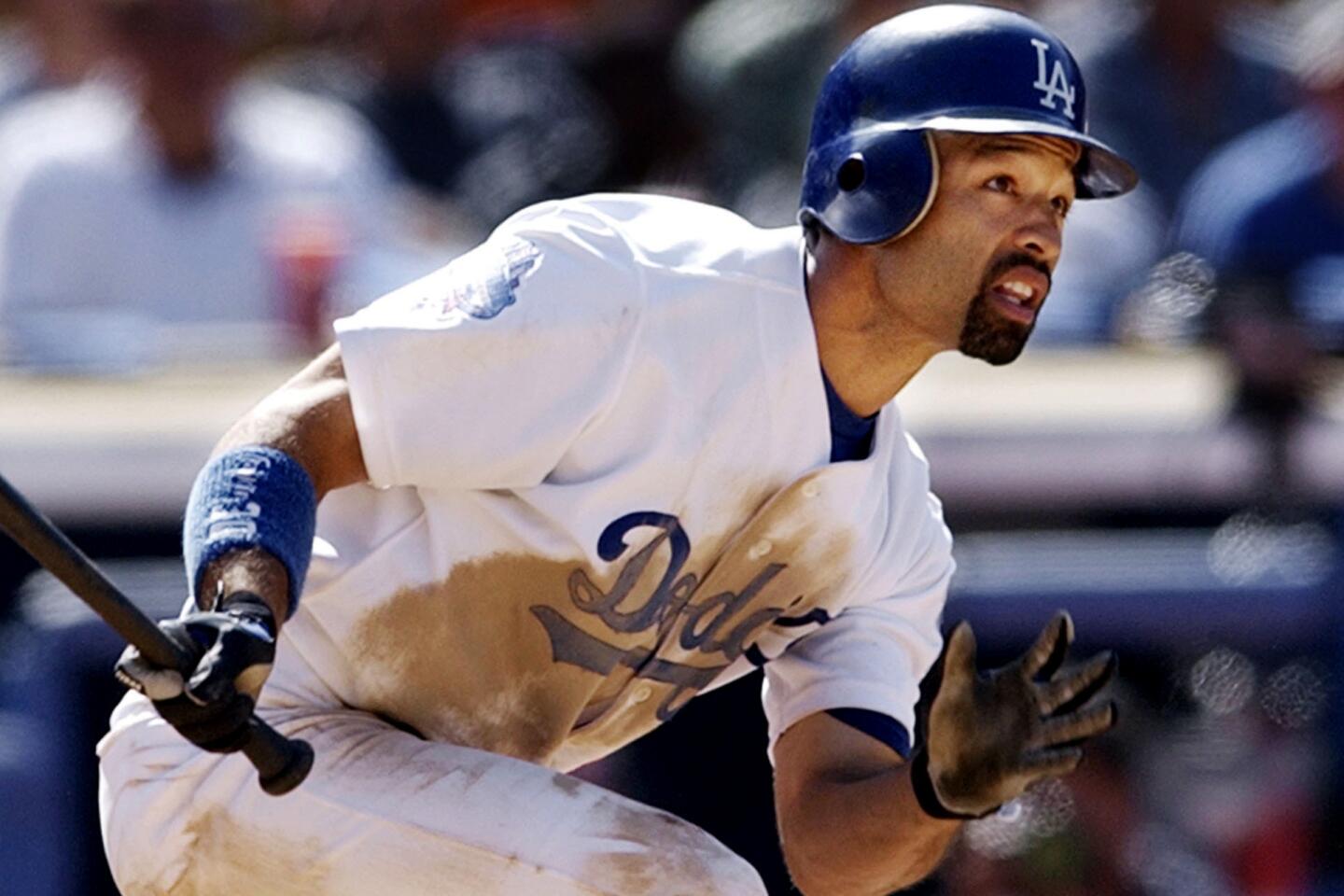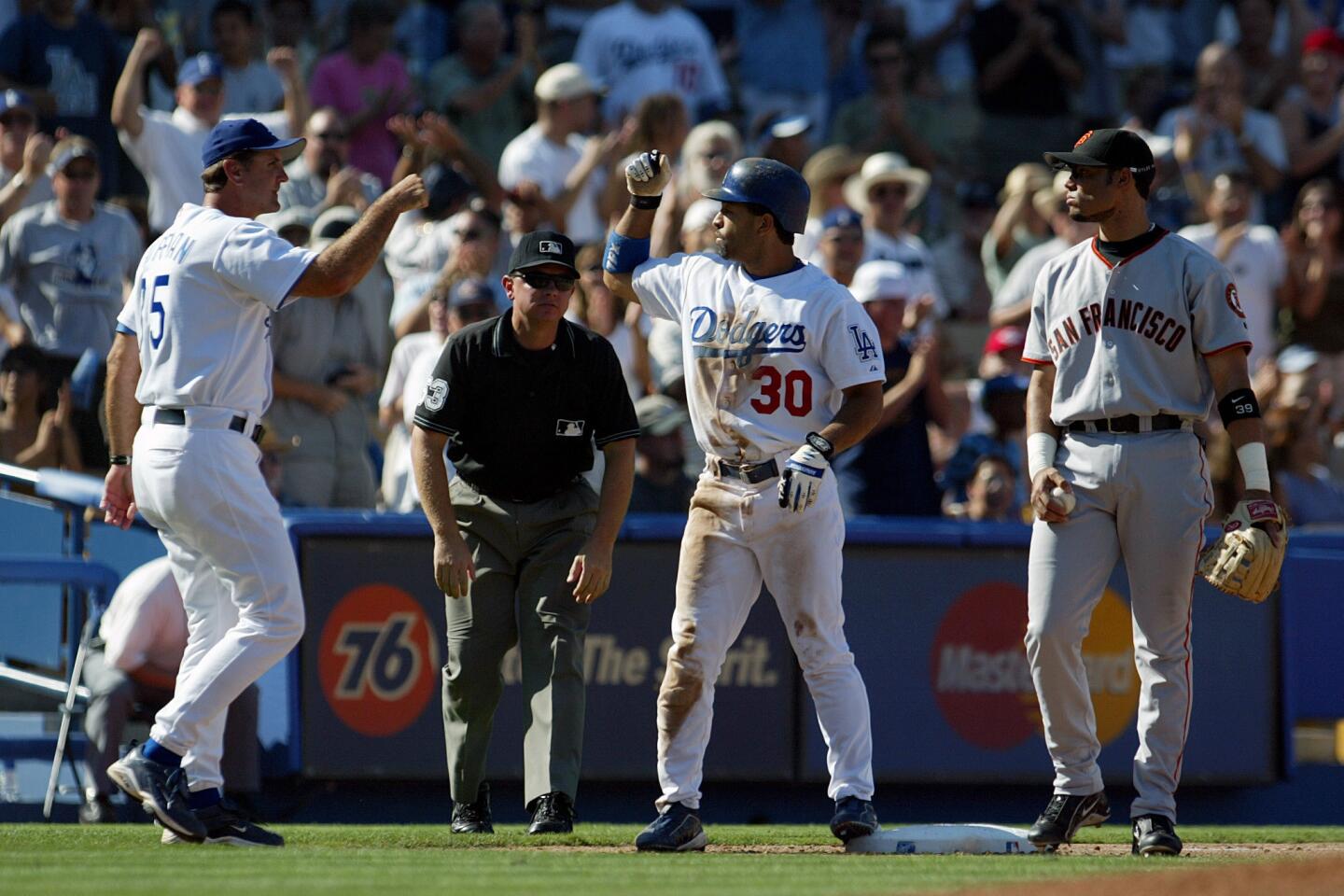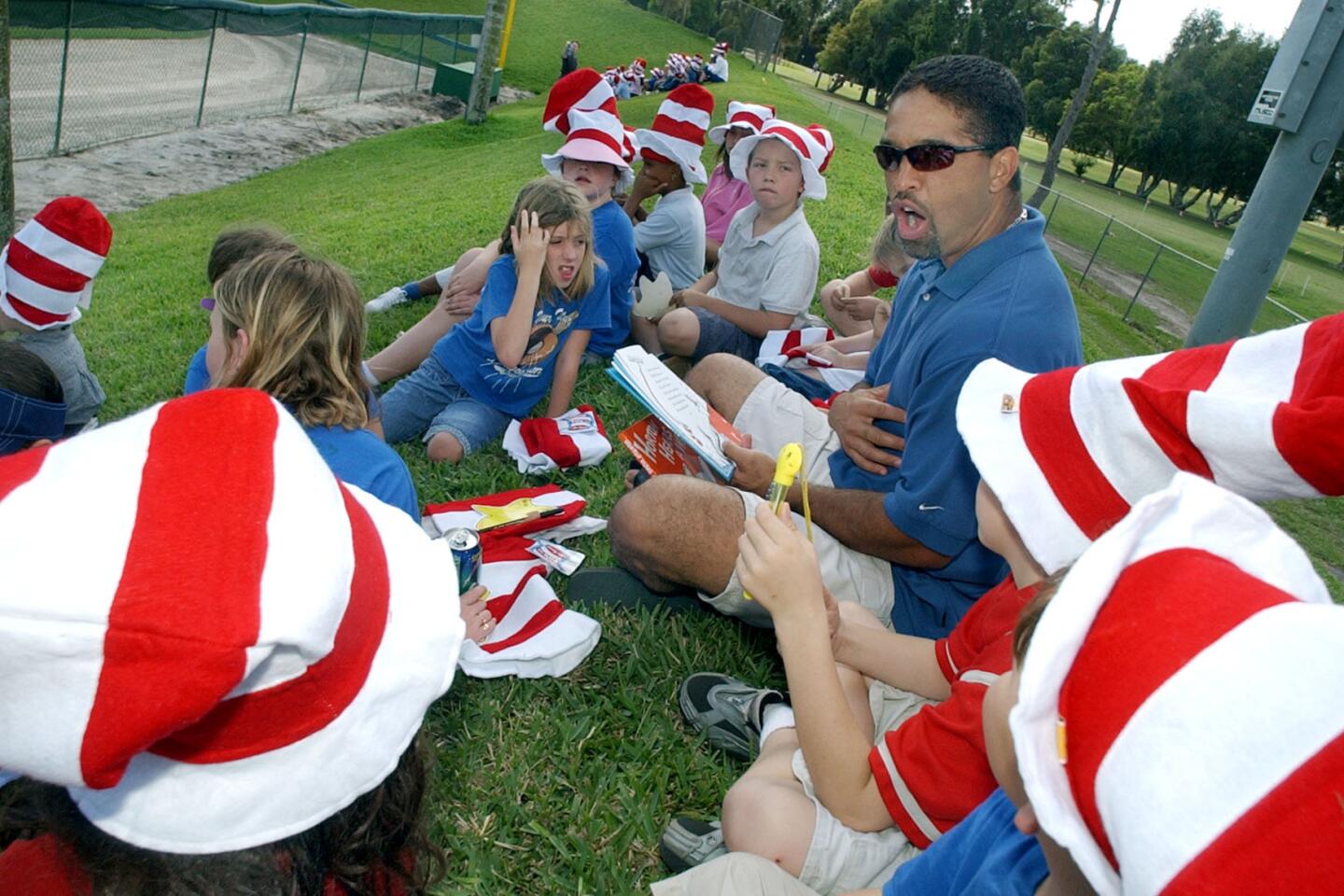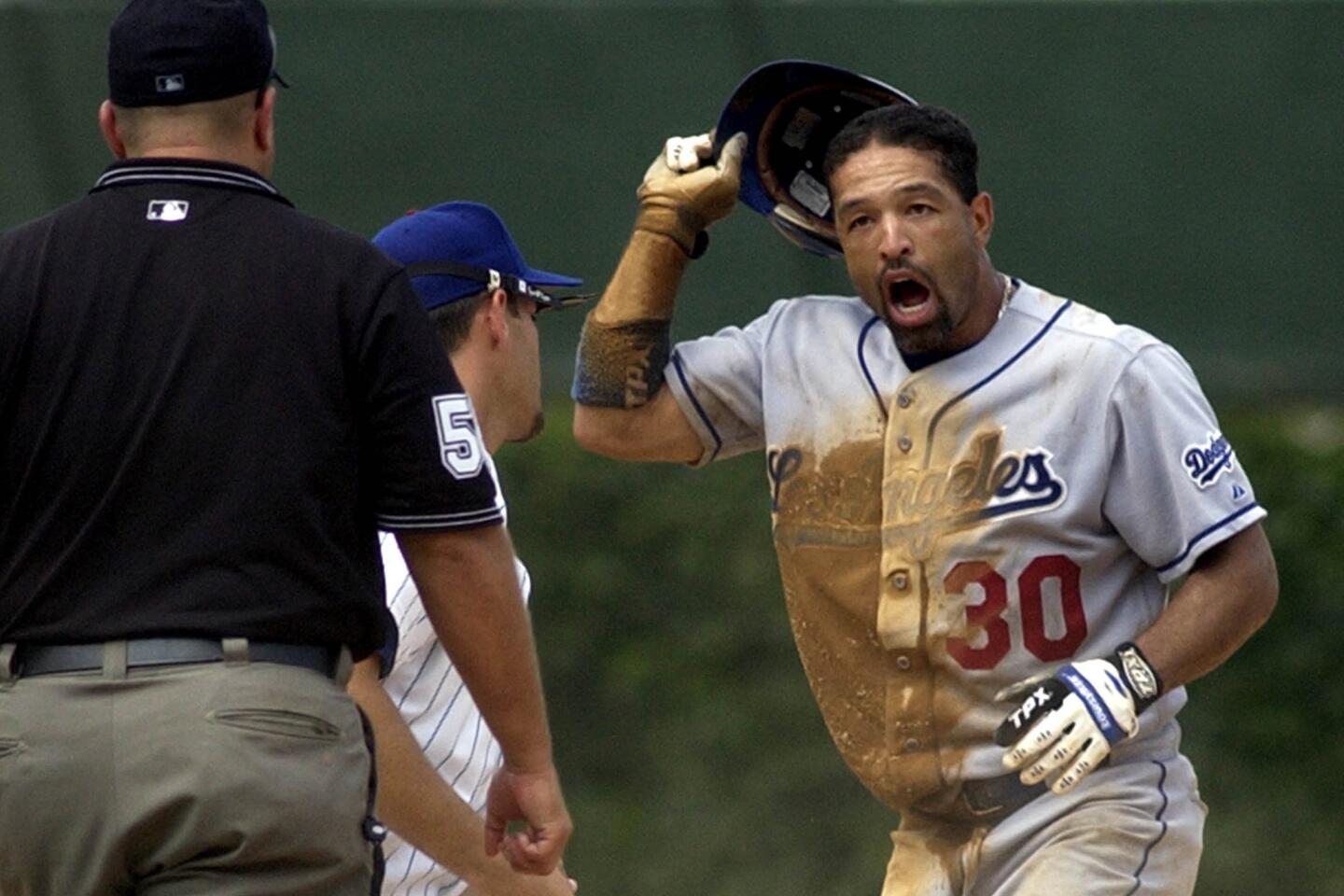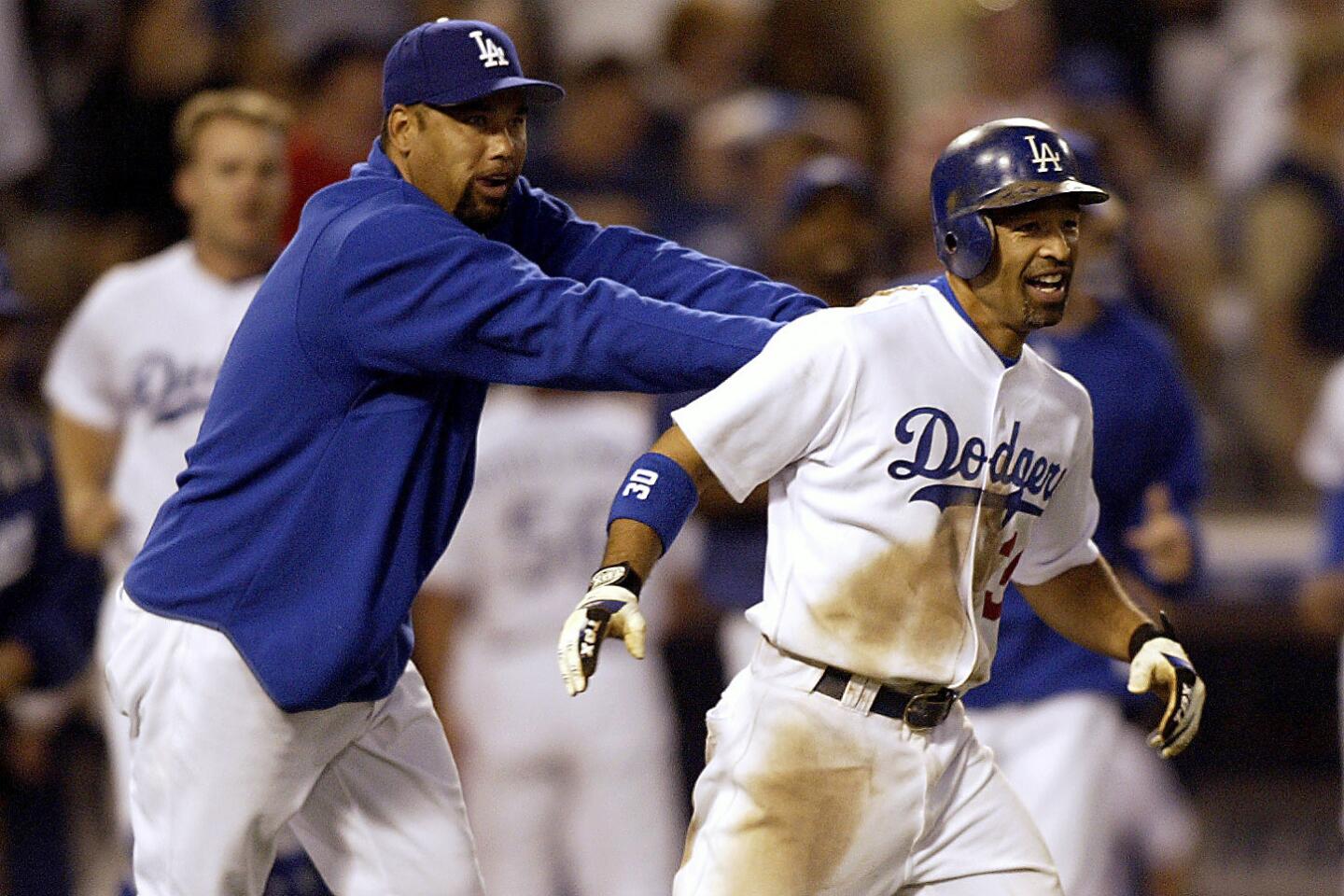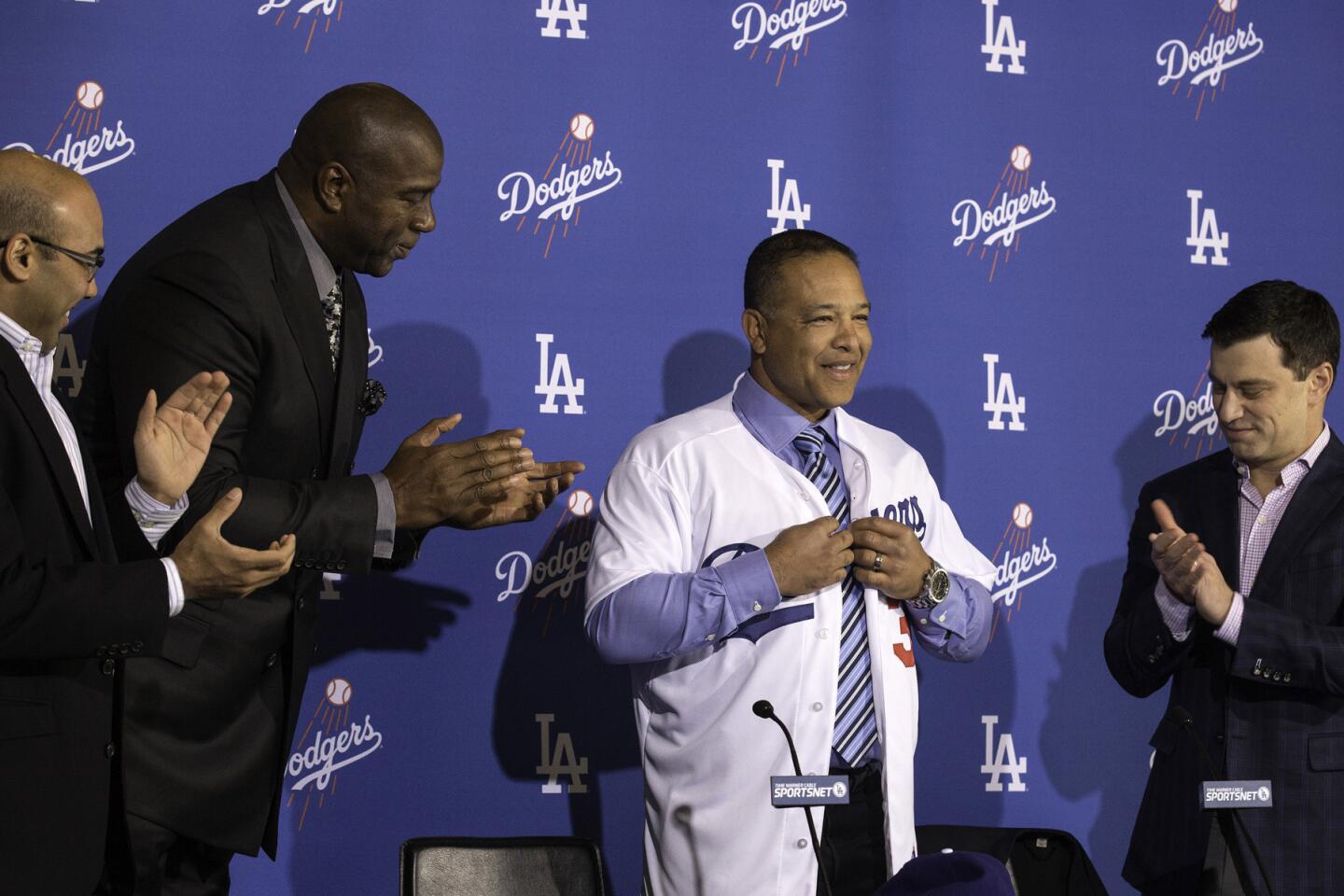As first spring training approaches, new Dodgers Manager Dave Roberts focuses on building unity
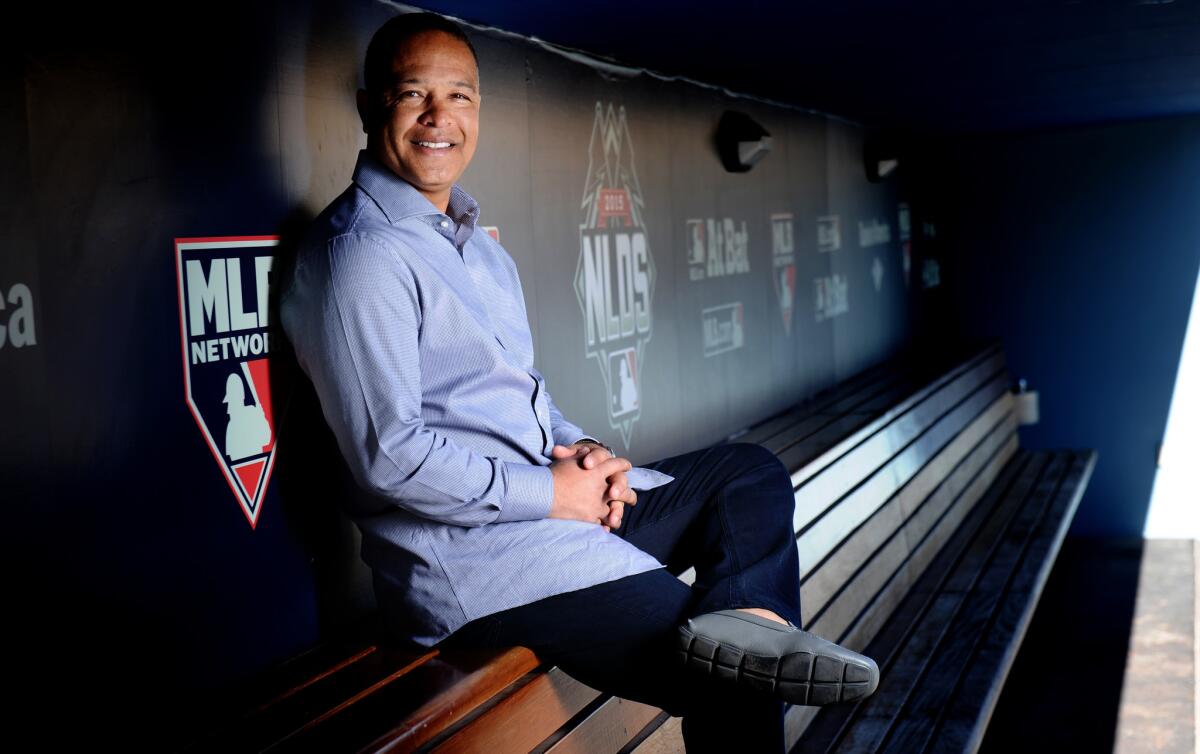
New Dodgers Manager Dave Roberts sits in the dugout before the start of the 2016 season.
- Share via
Dave Roberts tented his fingers and measured his words with care. He stared into the distance, a block away from the endless blue of the Pacific, two weeks away from his first spring training as manager of the Dodgers.
“The No. 1 goal ... is for us ... to create an unbreakable bond within the group,” Roberts said over breakfast at a cafe in Carlsbad. “Where no distractions ... get us away from staying together ... or getting our focus off track.”
He assembled the message piece by piece, the pauses injecting drama into an otherwise idyllic setting. A half-eaten plate of huevos rancheros sat in front of him as he let his mind drift, pondering the intricacies of his new position.
In order to crystallize his message before he interviewed for the job, he consulted friends and mentors, men who had won the World Series and the Super Bowl. The chorus echoed the advice of his wife, Tricia: “Just be yourself.”
An itinerant childhood taught Roberts how to build relationships. A 10-year big-league career granted the credibility necessary for his new role. A boundless sense of optimism propelled him as he learned the craft of coaching, survived cancer and earned the on-field stewardship of one of baseball’s marquee franchises.
“He’s an authentic guy,” said Toronto Blue Jays President Mark Shapiro, who has known Roberts for more than a decade: “Every bone in his body is sincere.”
Pitcher Chris Young, a former teammate in San Diego said of Roberts, “He’s just got that charisma to him that brings out the best in people, in a genuine way.”
Rob Manfred, commissioner of baseball, added, “He’s a really great ambassador for the sport.”
Roberts, 43, holds a position that invites the envy, and pity, of his peers. The Dodgers boast the game’s most accomplished pitcher, a roster overloaded with depth and a front office stocked with intellect. No team in baseball spends more on personnel. But the pressure is without rival.
The clubhouse has been splintered, and a championship drought is approaching its third decade. In October, after five winning seasons, the organization and Manager Don Mattingly divorced. After three consecutive division championships — but only one playoff series victory — Roberts sensed the frustration of the players during conversations this winter.
As manager, Roberts must inspire the meek and corral the headstrong. He must translate for his players the statistical insight and strategic advice offered by his bosses. He must unify 25 players — most of them rich, many of them famous, some of them antagonistic toward one another — toward one common goal.
But how?
“That’s the secret,” he said. “That’s the question. Because if we have that, then everything else will take care of itself.”
::
The best humor flows from the truth, and so on the day the Dodgers introduced Roberts as manager in December, Andrew Friedman, the man who hired him, quipped about the “answer key” Roberts brought to his first interview. He had said everything the team wanted to hear, the performance vaulting him out of a pack of nine candidates.
Roberts did not use a cheat sheet. But he did conduct hours of preparation, reaching far and wide to sculpt his message.
He admired the work of men like New England Patriots Coach Bill Belichick, San Antonio Spurs Coach Gregg Popovich and Seattle Seahawks Coach Pete Carroll. All three foster a culture in which the collective trumps the individual, the sort of spirit Roberts believes the Dodgers need to embrace.
Through a mutual friend, he reached out to Carroll.
“We had a great conversation about building a culture, developing an attitude, and forming a style for a team,” Carroll said in an email to The Times. “He’s very upbeat and it’ll be fun watching him blossom in his new role.”
With a roster expected to create daily matchup decisions, the sublimation of ego is critical. Roberts seeks an identity for the club that reflects this. He said he wants “a gritty group, a group that’s tenacious, a group that cares for one another, plays for one another, doesn’t care who gets the credit.”
As he prepared to interview, Roberts spoke with Bruce Bochy, his former manager in San Diego and San Francisco. He consulted Houston skipper A.J. Hinch, Padres executive Fred Uhlman Jr. and Miami Dolphins President Tom Garfinkel.
Roberts had spent the previous five seasons as a coach in San Diego, the last two as bench coach. As Bud Black’s deputy, Roberts coordinated the Padres’ running game, aided with defensive alignments and monitored the clubhouse’s pulse.
Before he interviewed, he asked Black about the specifics of spring training scheduling, the nuances of bullpen management and the administration of discipline.
“My advice to him,” said Black, now a special assistant to Angels General Manager Billy Eppler, “was ‘Be yourself. You’ve got a great knowledge base, you’ve got content. Let it show.’”
Shapiro, the Blue Jays president, befriended Roberts in the 1990s when he was a Cleveland Indians executive and Roberts was one of the team’s outfielders. Shapiro said he quizzed Roberts “to help him clarify his own vision for who he’d be as a manager.”
What did he admire about his previous managers, Shapiro asked Roberts. What would he do differently? How would the Dodgers front office perceive certain issues?
“I asked the questions,” Shapiro said. “I didn’t give him any answers. I just encouraged him to think a certain way about the interview.”
Roberts was a finalist for the Seattle Mariners’ opening last fall, but finished behind Scott Servais, an Anaheim ally of new General Manager Jerry Dipoto. Roberts turned his sights toward Los Angeles.
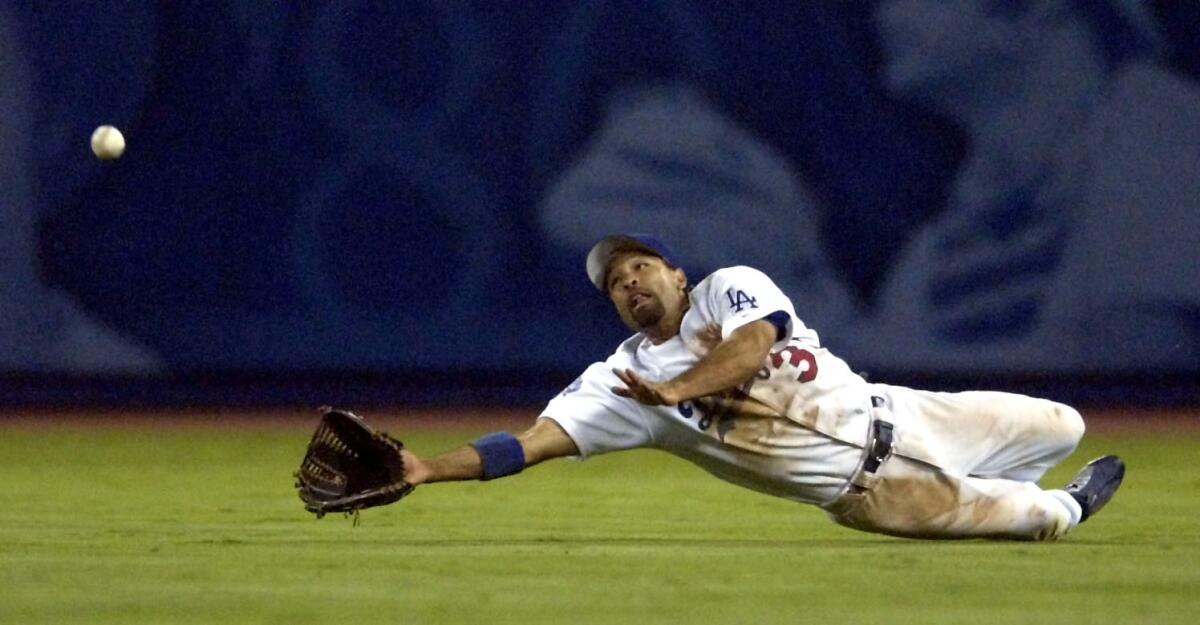
Dodger centerfielder Dave Roberts makes the catch on a ball hit by St. Louis’ Tino Martinez in 2002.
He understood he could not sell himself as a student of Bochy or an acolyte of Black. He did not want to portray himself as a sycophant, willing to blindly accept instructions from his superiors. He believed the Dodgers sought a man willing to engage in discussion.
During the meetings, Roberts received assurances about autonomy in certain areas. “I do respect chain of command,” he said. “But those guys have told me numerous times, when you’re talking about chain of command with lineup construction or in-game management, that starts with the manager.”
At the end of a search that Friedman called “exhaustive,” Roberts emerged as the choice over Gabe Kapler, a member of the front office and perceived favorite at the outset. Roberts won out when the organization opted for his coaching experience over Kapler’s ingenuity.
As Roberts posed for pictures and answered questions at his introductory news conference, Waymon Roberts sat in the audience with his wife and watched his son. A flash of memories struck him.
“He keeps surprising us,” Waymon said. “Whatever he puts his mind to, he puts his heart into.”
::
Waymon Roberts settled into a chair and reached into his past from his living room in Oceanside. On a coffee table lay a three-stringed shamisen — a Japanese musical instrument — atop a binder of sheet music. Nearby sat a stack of Dodgers drink coasters.
A scrawny kid growing up outside of Houston, Waymon enlisted in the Marines in 1968 and learned to repair radios. Deployed to Japan, he met and married his wife, Eiko. Their first child, David Ray, was born at the Army hospital in Okinawa in 1972. A sister soon followed.
The family bounced between military bases, first in California, then back to Okinawa, then from North Carolina to Hawaii. The Robertses settled just north of San Diego in 1984. Along the way, Dave mastered the art of assimilation. He loved the blend of cultures and the diversity of faces in military life.
“When I was growing up, I was the guy with a lot of different groups of friends,” Roberts said. “A connector. That’s who I was.”
His parents allowed him independence. Roberts thrived on social interactions. If he required discipline, the solution was simple. “If you took his friend time away, he was done,” Waymon, now 67, said with a smile. “He’d say ‘What do you want me to do, Dad?’”
As a child, Dave’s speed stood out. But Waymon noticed his ability to absorb information. When he watched football with his father, Dave could discuss the broadcast at a sophisticated level.
Football was his first love. As an undersized option quarterback, Roberts dreamed of gridiron glory. Then his knee buckled while he was making a cut during spring practice before his junior season at Rancho Buena Vista High.
In the 1980s, a torn anterior cruciate ligament often meant a ticket to retirement. Facing a teenager with an aching knee and fearful heart, the first doctor was blunt: His athletic career was over.
Dave could not accept a life without sports when “it hadn’t really gotten started,” his father explained. So they found a second doctor, one willing to perform surgery.
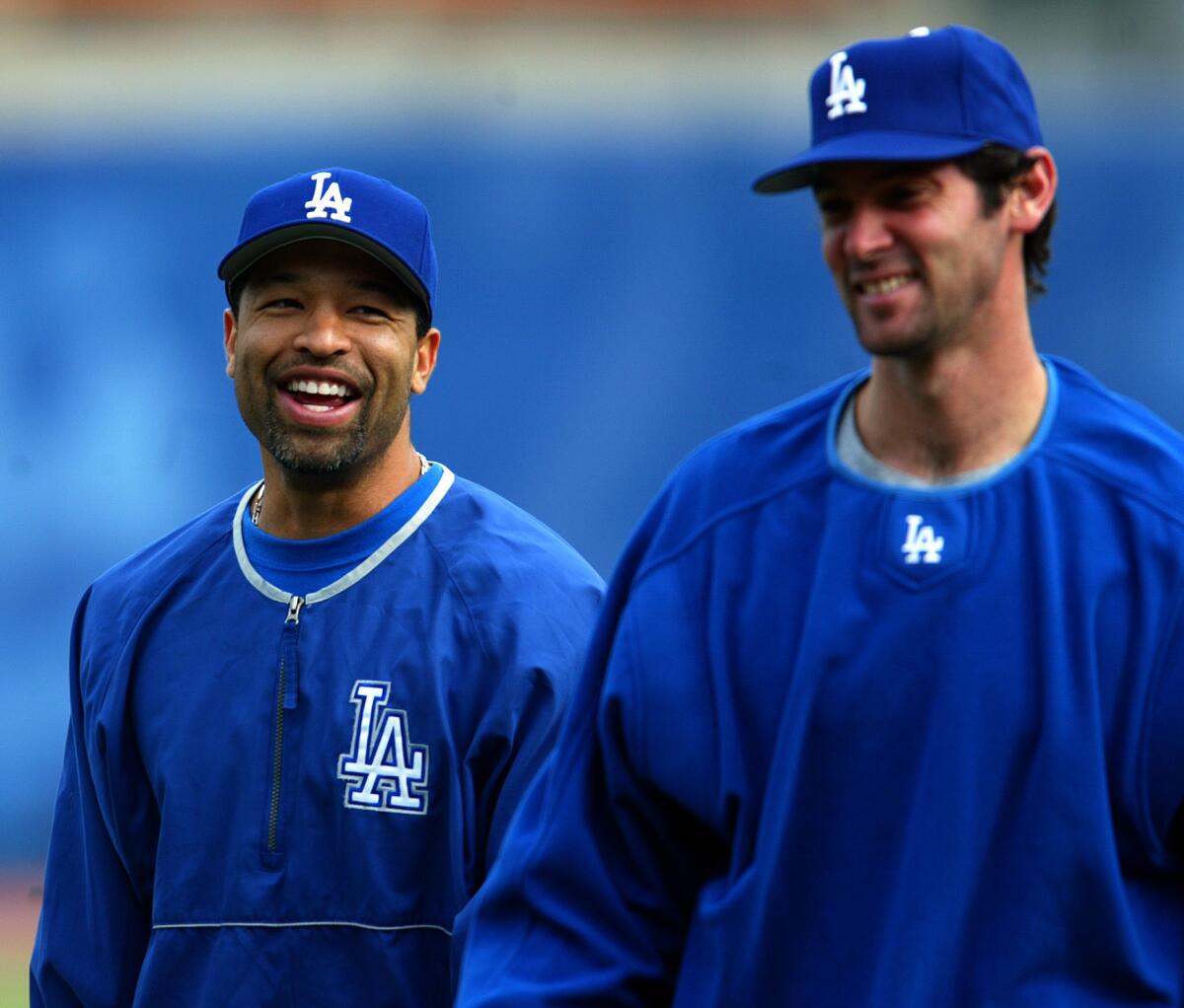
Dave Roberts, left, and Shawn Green share a laugh prior to the Dodgers’ first winter workout in 2004.
“When the knee got hurt that bad, it was the worst thing that ever happened to him,” Waymon said. “For him to know that he would have to have surgery, that was the hardest thing that we, as a family, had to face.”
After the procedure, the passion for football ebbed. He missed his junior year, which cost him a chance at recruitment for college baseball. As graduation approached, Roberts lost interest in his lone college offer, an appointment to play football for the Air Force Academy. Despite scant interest from colleges, he saw baseball as a more promising avenue.
“You’ve got to bet on yourself sometimes,” Roberts said.
The gamble paid off. Roberts walked on at UCLA and earned a scholarship as a sophomore. He accepted a $1,000 bonus when Detroit chose him in the 28th round of the 1994 draft. Five years later, he debuted with Cleveland. He became a regular with the Dodgers in 2002.
His legs and his keen eye made him valuable as a player. But the memories Roberts left among his teammates were often formed off the field. In a game predicated on failure, Roberts projected warmth that teammates saw as inviting and enthusiasm that felt genuine.
“One of the greatest attributes he has is bringing out the best in people around him,” said Young, who played with Roberts in 2006 and remains close with him. “Dave is as positive as they come. He always had your back.”
After he retired, Roberts spent the 2009 season as a broadcaster in Boston, where he was beloved for his role in a 2004 playoff, when he stole second base off New York Yankees closer Mariano Rivera and catalyzed one of the greatest comebacks in baseball history.
He battled Hodgkin’s lymphoma the next year, undergoing chemotherapy while visiting minor-league affiliates as a member of San Diego’s front office. Granted a clean bill of health, he joined the Padres’ coaching staff in 2011 and demonstrated that “his ability to relate and get through with players was high,” Black said.
About a year ago, Waymon asked his son about ambition. Did he want to be a manager? Maybe in a few years, Dave told his father.
“Boom,” Waymon said. “That thing accelerated.”
::
In an auditorium at the Kenneth Hahn Hall of Administration in downtown L.A., Roberts slipped his jersey over a gray and black button-down as a crowd surrounded him. Roberts grew accustomed to a certain type of folk-hero fame in Boston, but his new job thrust him into a different category of recognition.
“It’s not every day that people sign autographs in Board of Supervisors meetings,” a television reporter told him.
The Los Angeles County Board of Supervisors invited Roberts to receive a proclamation late last month. The Dodgers shattered baseball’s color barrier when Jackie Robinson debuted in 1947. Nearly 70 years later, the team hired Roberts, the son of an African American father and a Japanese mother, as its first minority manager.
“Progress,” supervisor Mark Ridley-Thomas said, “continues to be made.”
Yet as the 2016 season begins, Roberts joins Atlanta’s Fredi Gonzalez and Washington’s Dusty Baker as the only minority managers in baseball. In an interview with The Times, Commissioner Manfred said that improving diversity among the executive and managerial ranks was a “priority” of his administration.
In January, Major League Baseball chose Pittsburgh Pirates executive Tyrone Brooks to run its diversity pipeline program. The initiative seeks to increase the pool of entry-level workers within baseball while nurturing the careers of professionals already in the system.
In 1972, the year he died, Robinson lamented the lack of black managers in the sport he integrated. Roberts was born that same year. He saw beauty in the symmetry but emphasized that he must operate without extra weight on his shoulders.
“At the end of the day, you can look back at what piece I am in history,” Roberts said. “But as this process goes day to day, that’s not even a thought. I’m trying to be the best manager for the Los Angeles Dodgers I can be.”
In order to be a great manager, the Dodgers must win. In order to win, Roberts believes, the roster must pull together in ways that have proved difficult in years past.
In one of his first acts as manager, he flew to Texas and met with ace pitcher Clayton Kershaw, who told him, “I’ll do whatever you need.” During a meeting at the team’s Fan Fest, he offered a clean slate to outfielder Yasiel Puig, a distraction off the field and a disappointment on it in recent years. He asked Howie Kendrick, a stalwart at second base, about playing some third.
The conversations will continue this week, when Roberts arrives at the team’s complex in Phoenix and opens spring training. He will bring the social skills he learned as a child and the credibility he earned as a player. He will wed his experience with the research he conducted this fall.
The goal is that unbreakable bond, something so essential, yet so elusive.
“You can have all the money,” Roberts said. “You can have the highest payroll. You can have the best information. If you don’t have the best team, you’re not going to win.
“The players have got to realize that. And that’s our job.”
Twitter: @McCulloughTimes
More to Read
Are you a true-blue fan?
Get our Dodgers Dugout newsletter for insights, news and much more.
You may occasionally receive promotional content from the Los Angeles Times.
